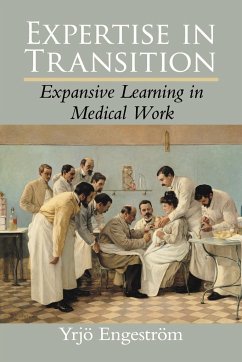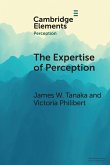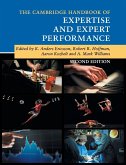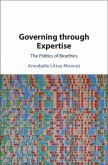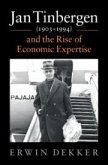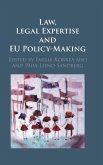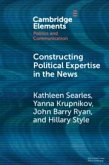Yrjo Engestrom (University of Helsinki)
Expertise in Transition
Yrjo Engestrom (University of Helsinki)
Expertise in Transition
- Broschiertes Buch
- Merkliste
- Auf die Merkliste
- Bewerten Bewerten
- Teilen
- Produkt teilen
- Produkterinnerung
- Produkterinnerung
This book challenges standard notions of expertise. In today's world, truly effective expertise is built on fluid collaboration between practitioners from multiple backgrounds. Expertise must be transformative, and must be able to tackle emerging new problems and changes in its organizational framework.
Andere Kunden interessierten sich auch für
![The Expertise of Perception The Expertise of Perception]() James W. Tanaka (British Columbia University of Victoria)The Expertise of Perception28,99 €
James W. Tanaka (British Columbia University of Victoria)The Expertise of Perception28,99 €![Transition Expertise and Identity Transition Expertise and Identity]() Christopher Connolly (Sporting Bodymind Ltd)Transition Expertise and Identity37,99 €
Christopher Connolly (Sporting Bodymind Ltd)Transition Expertise and Identity37,99 €![The Cambridge Handbook of Expertise and Expert Performance The Cambridge Handbook of Expertise and Expert Performance]() The Cambridge Handbook of Expertise and Expert Performance76,99 €
The Cambridge Handbook of Expertise and Expert Performance76,99 €![Governing through Expertise Governing through Expertise]() Annabelle Littoz-Monnet (Graduate Institute of International and DeGoverning through Expertise97,99 €
Annabelle Littoz-Monnet (Graduate Institute of International and DeGoverning through Expertise97,99 €![Jan Tinbergen (1903-1994) and the Rise of Economic Expertise Jan Tinbergen (1903-1994) and the Rise of Economic Expertise]() Erwin Dekker (Erasmus Universiteit Rotterdam)Jan Tinbergen (1903-1994) and the Rise of Economic Expertise53,99 €
Erwin Dekker (Erasmus Universiteit Rotterdam)Jan Tinbergen (1903-1994) and the Rise of Economic Expertise53,99 €![Law, Legal Expertise and EU Policy-Making Law, Legal Expertise and EU Policy-Making]() Law, Legal Expertise and EU Policy-Making117,99 €
Law, Legal Expertise and EU Policy-Making117,99 €![Constructing Political Expertise in the News Constructing Political Expertise in the News]() Kathleen Searles (Louisiana State University)Constructing Political Expertise in the News22,99 €
Kathleen Searles (Louisiana State University)Constructing Political Expertise in the News22,99 €-
-
-
This book challenges standard notions of expertise. In today's world, truly effective expertise is built on fluid collaboration between practitioners from multiple backgrounds. Expertise must be transformative, and must be able to tackle emerging new problems and changes in its organizational framework.
Produktdetails
- Produktdetails
- Verlag: Cambridge University Press
- Seitenzahl: 292
- Erscheinungstermin: 15. März 2019
- Englisch
- Abmessung: 229mm x 152mm x 16mm
- Gewicht: 416g
- ISBN-13: 9780521407854
- ISBN-10: 0521407850
- Artikelnr.: 51127070
- Herstellerkennzeichnung
- Libri GmbH
- Europaallee 1
- 36244 Bad Hersfeld
- gpsr@libri.de
- Verlag: Cambridge University Press
- Seitenzahl: 292
- Erscheinungstermin: 15. März 2019
- Englisch
- Abmessung: 229mm x 152mm x 16mm
- Gewicht: 416g
- ISBN-13: 9780521407854
- ISBN-10: 0521407850
- Artikelnr.: 51127070
- Herstellerkennzeichnung
- Libri GmbH
- Europaallee 1
- 36244 Bad Hersfeld
- gpsr@libri.de
Yrjö Engeström is Professor Emeritus of Communication at the University of California, San Diego and Professor Emeritus of Adult Education at the University of Helsinki, Finland, where he is also Director of the Center for Research on Activity, Development, and Learning (CRADLE). In his work, Engeström applies and develops cultural-historical activity theory as a framework for the study of transformations in educational settings, work environments, and communities. He has carried out interventionist research in health care settings for over thirty years. He is known for his theory of expansive learning and for the methodology of formative interventions, including the Change Laboratory method. Engeström's most recent books are From Teams to Knots: Activity-Theoretical Studies of Collaboration and Learning at Work (Cambridge, 2008), Learning by Expanding: An Activity-Theoretical Approach to Developmental Research (Cambridge, Second Edition, 2015), and Studies in Expansive Learning: Learning What Is Not Yet There (Cambridge, 2016).
Part I. The Theoretical Landscape: 1. Toward a new framework for understanding expertise
Part II. Expertise as Objected-Oriented Activity: 2. Constructing the object in the work activity of primary care physicians
3. Objects and contradictions as drivers of expert work
4. Spatial and temporal expansion of the object
Part III. Expertise as Knotworking: 5. The emergence of knotworking in medicine
6. Knotworking as expansive decision making
7. Knotworking as history making
Part IV. Expertise as Expansive Learning: 8. Expansive visibilization of medical work
9. Expansive learning in a hospital
10. The horizontal dimension of expansive learning
Part V. Toward Collaborative and Transformative Expertise: 11. From stabilization knowledge to possibility knowledge
12. Expertise in transition.
Part II. Expertise as Objected-Oriented Activity: 2. Constructing the object in the work activity of primary care physicians
3. Objects and contradictions as drivers of expert work
4. Spatial and temporal expansion of the object
Part III. Expertise as Knotworking: 5. The emergence of knotworking in medicine
6. Knotworking as expansive decision making
7. Knotworking as history making
Part IV. Expertise as Expansive Learning: 8. Expansive visibilization of medical work
9. Expansive learning in a hospital
10. The horizontal dimension of expansive learning
Part V. Toward Collaborative and Transformative Expertise: 11. From stabilization knowledge to possibility knowledge
12. Expertise in transition.
Part I. The Theoretical Landscape: 1. Toward a new framework for understanding expertise
Part II. Expertise as Objected-Oriented Activity: 2. Constructing the object in the work activity of primary care physicians
3. Objects and contradictions as drivers of expert work
4. Spatial and temporal expansion of the object
Part III. Expertise as Knotworking: 5. The emergence of knotworking in medicine
6. Knotworking as expansive decision making
7. Knotworking as history making
Part IV. Expertise as Expansive Learning: 8. Expansive visibilization of medical work
9. Expansive learning in a hospital
10. The horizontal dimension of expansive learning
Part V. Toward Collaborative and Transformative Expertise: 11. From stabilization knowledge to possibility knowledge
12. Expertise in transition.
Part II. Expertise as Objected-Oriented Activity: 2. Constructing the object in the work activity of primary care physicians
3. Objects and contradictions as drivers of expert work
4. Spatial and temporal expansion of the object
Part III. Expertise as Knotworking: 5. The emergence of knotworking in medicine
6. Knotworking as expansive decision making
7. Knotworking as history making
Part IV. Expertise as Expansive Learning: 8. Expansive visibilization of medical work
9. Expansive learning in a hospital
10. The horizontal dimension of expansive learning
Part V. Toward Collaborative and Transformative Expertise: 11. From stabilization knowledge to possibility knowledge
12. Expertise in transition.

